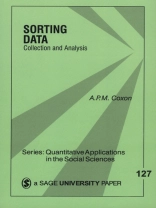The method of sorting is a flexible, easily-used (and enjoyable) technique well suited to exploring and mapping conceptual domains, to the study of subjective or folk-classifications, and to comparing existing classifications one with another. Originating in linguistics and psychology, sorting methods (also known as ‘own categories’, and ‘pile-sorting’) have diffused to a wide range of other social sciences.
This book provides the first systematic introduction to the method of sorting and draws material from new and widely-scattered sources. It covers the collection and analysis of data, using free-sorting as the main focus, but includes other variants. Methods are provided for describing and comparing sortings, drawing on recent developments in partition theory and combinational analysis and for measuring their similarity. Appropriate methods are presented for the representation of both individual sortings and of the objects themselves: multidimensional scaling, correspondence analysis, and clustering techniques. Applications and available software are covered.
表中的内容
Introduction
Collecting Free-Sorting Data
Describing and Comparing Sortings
Analyising Sorting Data
关于作者
Tony Coxon was an Honorary Professorial Fellow at the University of Edinburgh′s School of Social and Political Studies. He was also Emeritus Professor, University of Wales, College of Cardiff. He taught MDS and advanced quantitative methods for more than 30 years and wrote numerous articles on the various techniques and models associated with MDS. Most notably, Dr. Coxon published three methodology texts: The User′s Guide to Multidimensional Scaling (1982, Heineman); Key Texts in Multidimensional Scaling (1982, Heineman); and Sorting Data: Collection and Analysis (1999, Sage QASS series). He wrote 41 entries in the Concise Oxford Dictionary of Sociology, and most recently wrote the entry on multidimensional scaling for The SAGE Encyclopedia of Social Science Research Methods (2003).












